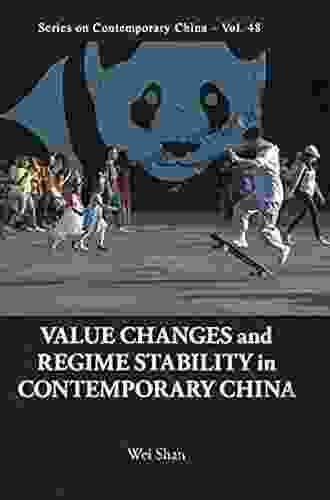Value Changes and Regime Stability in Contemporary China: Series on Contemporary China

Abstract: This article examines the complex relationship between value changes and regime stability in contemporary China. Drawing on a wide range of empirical data and theoretical perspectives, it argues that value changes are a key factor shaping the stability of the Chinese regime, but that their impact is mediated by a number of other factors, including the regime's institutional structure, its ability to adapt to changing circumstances, and the level of public support it enjoys. The article concludes by discussing the implications of these findings for the future of the Chinese regime.
Keywords: Value changes, regime stability, China, contemporary China, Chinese politics
4.8 out of 5
| Language | : | English |
| File size | : | 3519 KB |
| Text-to-Speech | : | Enabled |
| Screen Reader | : | Supported |
| Enhanced typesetting | : | Enabled |
| Word Wise | : | Enabled |
| Print length | : | 148 pages |
China has undergone a profound transformation in recent decades. Economic reforms have led to rapid economic growth and a dramatic improvement in living standards. Social reforms have loosened the grip of the state on society and given individuals greater freedom of expression and movement. These changes have been accompanied by a shift in values, with traditional values such as collectivism and obedience to authority giving way to more individualistic and materialistic values.
These value changes have the potential to have a significant impact on the stability of the Chinese regime. On the one hand, they could lead to increased demands for political liberalization and reform. On the other hand, they could also lead to a decline in social cohesion and a loss of faith in the government. The impact of value changes on regime stability is therefore a complex and contested issue.
In this article, we examine the relationship between value changes and regime stability in contemporary China. We draw on a wide range of empirical data and theoretical perspectives to argue that value changes are a key factor shaping the stability of the Chinese regime, but that their impact is mediated by a number of other factors, including the regime's institutional structure, its ability to adapt to changing circumstances, and the level of public support it enjoys. We conclude by discussing the implications of these findings for the future of the Chinese regime.
Value Changes in Contemporary China
Value changes in contemporary China have been documented by a wide range of scholars. These changes have been particularly pronounced among young people, who are more likely to embrace individualistic and materialistic values than their parents and grandparents (Li, 2009; Wang, 2011).
One of the most striking value changes in contemporary China has been the decline of collectivism. Collectivism is a value that emphasizes the importance of the group over the individual. It is a key component of traditional Chinese culture, which stresses the importance of family, community, and the nation. However, collectivism has been eroded in recent decades by economic reforms, which have encouraged individualism and competition. As a result, young people in China are increasingly likely to prioritize their own individual interests over the interests of the group.
Another significant value change in contemporary China has been the rise of materialism. Materialism is a value that emphasizes the importance of material possessions and wealth. It is often associated with consumerism and a desire for a high standard of living. Materialism has been on the rise in China in recent decades, as economic reforms have made it possible for more people to acquire material goods. As a result, young people in China are increasingly likely to define success in terms of material wealth.
The Impact of Value Changes on Regime Stability
The impact of value changes on regime stability is a complex and contested issue. Some scholars argue that value changes can lead to increased demands for political liberalization and reform. They argue that as people become more individualistic and materialistic, they are more likely to challenge the authority of the state and demand a greater say in how they are governed. Others argue that value changes can lead to a decline in social cohesion and a loss of faith in the government. They argue that as people become more focused on their own individual interests, they are less likely to be concerned about the needs of society as a whole. This can lead to a decline in social trust and a loss of faith in the government's ability to address the needs of the people.
The impact of value changes on regime stability is likely to vary depending on a number of factors, including the regime's institutional structure, its ability to adapt to changing circumstances, and the level of public support it enjoys. In a regime with strong institutions and a high level of public support, value changes are less likely to lead to instability. However, in a regime with weak institutions and a low level of public support, value changes are more likely to trigger instability.
The Case of China
The Chinese regime has undergone a number of significant changes in recent decades in response to the challenges posed by value changes. These changes include:
* The adoption of a market economy: The Chinese government has adopted a market economy in order to promote economic growth and improve living standards. This has led to a significant increase in individualism and materialism, as people have become more focused on their own individual economic interests. * The loosening of social controls: The Chinese government has loosened social controls in order to give people more freedom of expression and movement. This has led to a decline in collectivism, as people have become more independent and less reliant on the state. * The development of new political institutions: The Chinese government has developed new political institutions in order to accommodate the demands of a changing society. These institutions include the National People's Congress, which is the highest legislative body in China, and the Chinese People's Political Consultative Conference, which is a consultative body that provides advice to the government.
These changes have helped the Chinese regime to adapt to the challenges posed by value changes. However, the regime still faces a number of challenges, including:
* The widening gap between rich and poor: The economic reforms have led to a widening gap between rich and poor in China. This has led to social tensions and resentment, which could threaten the stability of the regime. * The rise of social movements: The loosening of social controls has led to the rise of social movements in China. These movements are often critical of the government and demand greater political liberalization. They could pose a challenge to the stability of the regime if they become too large or too powerful. * The aging population: The Chinese population is aging rapidly. This is putting a strain on the government's resources and could lead to a decline in economic growth. It could also lead to a decline in social cohesion, as the elderly are less likely to be involved in the labor force and are more likely to rely on the state for support.
The Chinese regime is facing a number of challenges, but it has also shown a remarkable ability to adapt to changing circumstances. It is too early to say whether the regime will be able to overcome these challenges and maintain stability in the long run. However, the regime's record of adaptation suggests that it is likely to remain in power for the foreseeable future.
Value changes are a key factor shaping the stability of the Chinese regime. However, their impact is mediated by a number of other factors, including the regime's institutional structure, its ability to adapt to changing circumstances, and the level of public support it enjoys. The Chinese regime has undergone a number of significant changes in recent decades in response to the challenges posed by value changes. These changes have helped the regime to adapt to the challenges posed by value changes, but the regime still faces a number of challenges. The regime's record of adaptation suggests that it is likely to remain in power for the foreseeable future. However, it is too early to say whether the regime will be able to overcome these challenges and maintain stability in the long run.
4.8 out of 5
| Language | : | English |
| File size | : | 3519 KB |
| Text-to-Speech | : | Enabled |
| Screen Reader | : | Supported |
| Enhanced typesetting | : | Enabled |
| Word Wise | : | Enabled |
| Print length | : | 148 pages |
Do you want to contribute by writing guest posts on this blog?
Please contact us and send us a resume of previous articles that you have written.
 Book
Book Chapter
Chapter Text
Text Story
Story Reader
Reader Library
Library Paperback
Paperback Newspaper
Newspaper Paragraph
Paragraph Sentence
Sentence Glossary
Glossary Bibliography
Bibliography Foreword
Foreword Manuscript
Manuscript Scroll
Scroll Tome
Tome Bestseller
Bestseller Classics
Classics Biography
Biography Memoir
Memoir Reference
Reference Dictionary
Dictionary Thesaurus
Thesaurus Narrator
Narrator Resolution
Resolution Librarian
Librarian Catalog
Catalog Periodicals
Periodicals Study
Study Scholarly
Scholarly Lending
Lending Reserve
Reserve Journals
Journals Reading Room
Reading Room Special Collections
Special Collections Interlibrary
Interlibrary Storytelling
Storytelling Awards
Awards Book Club
Book Club Textbooks
Textbooks Honey Snug Llc
Honey Snug Llc David L Rennie
David L Rennie Manik Joshi
Manik Joshi Andrew Boland
Andrew Boland Pablo E Cisneros
Pablo E Cisneros Monica Wellington
Monica Wellington Arthur C Bohart
Arthur C Bohart Karen E Rignall
Karen E Rignall Davies Cheruiyot
Davies Cheruiyot Miriam Tocino
Miriam Tocino Jorge Van De Perre
Jorge Van De Perre Richard G Beauchamp
Richard G Beauchamp Ronan Hession
Ronan Hession Joni Mccoy
Joni Mccoy Dr Mark Alan Wade
Dr Mark Alan Wade Steve Reeder
Steve Reeder Alexandra T Vazquez
Alexandra T Vazquez Craig A Doherty
Craig A Doherty Joe Thomas
Joe Thomas Andrew Stafford
Andrew Stafford
Light bulbAdvertise smarter! Our strategic ad space ensures maximum exposure. Reserve your spot today!

 Gene PowellQuilting, Sewing, Knitting, Crocheting, and Cross-Stitching: A Comprehensive...
Gene PowellQuilting, Sewing, Knitting, Crocheting, and Cross-Stitching: A Comprehensive... Nathan ReedFollow ·17.8k
Nathan ReedFollow ·17.8k Al FosterFollow ·6.7k
Al FosterFollow ·6.7k Brian BellFollow ·19.1k
Brian BellFollow ·19.1k Steve CarterFollow ·3.9k
Steve CarterFollow ·3.9k Fletcher MitchellFollow ·19k
Fletcher MitchellFollow ·19k Terry BellFollow ·15.9k
Terry BellFollow ·15.9k Curtis StewartFollow ·5.4k
Curtis StewartFollow ·5.4k George OrwellFollow ·13.2k
George OrwellFollow ·13.2k

 Dallas Turner
Dallas TurnerParasols and Peril: Adventures in Grace
In the quaint town...

 Caleb Carter
Caleb CarterFlight Attendant Joe: A Dedicated Professional in the...
Flight Attendant Joe...

 Jerry Ward
Jerry WardPick Lottery The List For 23 States August 15 2024
The Pick Lottery is a multi-state lottery...

 Hudson Hayes
Hudson HayesHow the Media Wields Dangerous Words to Divide a Nation
In a world where the media is...

 Curtis Stewart
Curtis StewartThe Magic Mala: A Story That Changes Lives
In the realm of ancient traditions and...

 Raymond Parker
Raymond ParkerEarthly Meditations: A Poetic Tapestry of Nature,...
In the realm of contemporary...
4.8 out of 5
| Language | : | English |
| File size | : | 3519 KB |
| Text-to-Speech | : | Enabled |
| Screen Reader | : | Supported |
| Enhanced typesetting | : | Enabled |
| Word Wise | : | Enabled |
| Print length | : | 148 pages |










